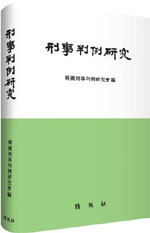- 영문명
- Criminality of Threatening Expression of Right
- 발행기관
- 한국형사판례연구회
- 저자명
- 강우예(Wu Ye, Kang)
- 간행물 정보
- 『형사판례연구』형사판례연구 제19권, 179~209쪽, 전체 31쪽
- 주제분류
- 법학 > 법학
- 파일형태
- 발행일자
- 2011.06.30
6,520원
구매일시로부터 72시간 이내에 다운로드 가능합니다.
이 학술논문 정보는 (주)교보문고와 각 발행기관 사이에 저작물 이용 계약이 체결된 것으로, 교보문고를 통해 제공되고 있습니다.

국문 초록
영문 초록
The issue of this paper is what is the definite limit of criminal coercion and how it can be determined. Basically, even if an actor gives threat to the victim, of which substance is within the scope of the actor’s right, that threatening expression can be subject to criminal punishment. In that case, if the actor does the act threatened, his act is out of the scope of criminal punishment. Korean Supreme Court has decided that, in consideration of motive and means of a threatening act, it can be wrong. Herewith, the problem is based on what standard the threatening act’s morality can be taken into consideration. Although morality of threatening act can be considered in the aspect of coercion, extortion and threat, is there any difference among them? The invasion on freedom of victim is the primary legal interest in this issue and also the invasion on freedom of actor should be taken seriously. These two aspects of threatening act should be taken to strike a balance in the area of our daily lives and market. Because the flexibility of decision of criminality of a threatening act makes it possible to restrict our legitimate activities too excessively, kinds of wisdom and principle should be invited in this area. We should note that the method of Korean Supreme Court of deciding criminality of verbal threatening is a wide scope of consideration of circumstances of an actor’s motives, means, benefits and disadvantages of his acts, etc. Also, the current interpretation of coercion, extortion and threat in Korean Criminal Code has paid more attention into violation of general morality in our society, rather than personal right to freedom from threatening expression. This interpretation seems to invite so various consideration of immorality of an actor’s threatening act. The standard of consideration of the cases in issue should be more specified. If it cannot be, it should be subject to constitutional review, based on principle of freedom and clarity. In America, If freedom of expression is in issue, the words existing in the provision of criminal punishment should be more rigorously reviewed. In Lewis v. City of New Orleans, the New Orleans’ criminal provision make it an offense “wantonly to cures or revile or to sue obscene or opprobrious language toward……” The supreme court of New Orleans strike down the provision in violation of the First Amendment, because it is too vague and general for the purpose of the Amendment. After the court s decision, the New Orleans legislator revise the provision, that you can be subject to punishment, if you falsely accuse some person of a crime or testify falsely or provide false information. By focusing on the wrongfulness of expression itself, the provision provide some restriction on punishment of an actor who expresses something within his right but with some inappropriate and base motives. Still, there remains flexible possibility of interpretation that must be a great challenge of that area.
목차
Ⅰ. 문제의 소재
Ⅱ. 권리․ 권한행사 의사표시의 불법의 내용
Ⅲ. 미국의 협박죄와 관련된 논의와 시사점
Ⅳ. 결론
해당간행물 수록 논문
- 진술거부권 행사와 증거이용금지 및 피의자신문권과의 관계
- 전직한 종업원의 영업비밀 사용과 업무상 배임죄
- 배임죄와 사기죄의 경합관계
- 아이템 거래 판결에 대한 고찰
- 절도죄의 객체로서 재물의 ‘재산적 가치’에 대한 검토
- 위치추적 전자장치 부착명령과 불이익변경금지
- 증언절차의 소송법 규정위반과 위증죄의 성립여부
- 형의 실효의 법률적 효과
- 불법적 · 반윤리적 목적의 승낙과 상해
- 영업범의 개념과 죄수관계
- 심신장애 판단과 감정
- 2010년도 형법판례 회고
- 협박의 의미와 대상
- 성풍속범죄에 대한 비판적 고찰
- 고소인이 간통죄의 제1심 판결 선고 후 피고소인과 다시 혼인한 경우 등과 간통고소의 효력
- 부동산 명의수탁자의 횡령죄 주체성
- 디지털 증거의 진정성립부인과 증거능력 부여 방안
- 건설산업기본법 위반죄(부정취득)와 배임수재죄의 관계
- 환자의 전원(轉院)에 있어서의 의료과실
- 권리․권한실행 의사표시의 협박죄 성립





